 Connect with us
Connect with us

 Aug 08, 2023
Aug 08, 2023
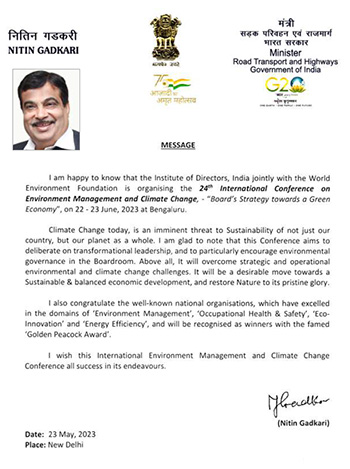 |
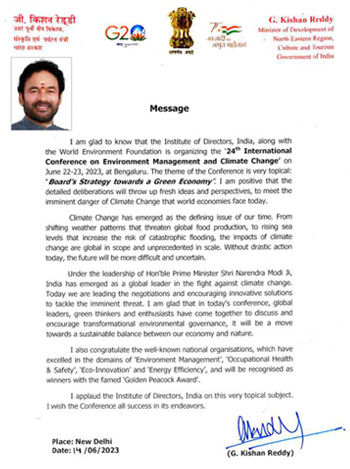 |
The Institute of Directors, India, organised the 24th International Conference on Environment Management and Climate Change in Bengaluru (India) on June 22–23, 2023. The venue of the Conference was Hotel Lalit Ashok. The Theme of this year's Conference was: “Board's Strategy towards a Green Economy”. The famed Golden Peacock Awards instituted by the Institute of Directors, India, for 'Occupational Health & Safety', 'Environment Management', 'Eco-Innovation' and 'Energy Efficiency' for the year 2023 were also presented to the winners amongst business and industry at the Awards ceremony.
The Convention was attended by more than 400 participants, comprising Industry and Business leaders, Board members, Directors, policy makers, educationists, and private as well as public sector institutions. It also witnessed participation by senior officials from the Government of Karnataka as well as delegates from a number of foreign countries, including Germany, France, Switzerland, the United Arab Emirates (UAE), and the United Kingdom (UK).
The Government of India was represented by:
1. Mr. Sailesh, IAS
Member, Public Enterprises Selection Board (PESB)
former Secretary, Department of Public Enterprises, Ministry of Heavy Industries & Public Enterprises
2. Mr. Chanchal Kumar, IAS
Special Secretary & Managing Director
National Highways & Infrastructure Development Corporation Limited (NHIDCL)
The State Government of Karnataka was represented by:
1. Dr. Jagmohan Sharma, IFS
Director General
Environmental Management & Policy Research Institute, India (EMPRI)
2. Dr. Ram Prasath Manohar V., IAS
Director
Department of Tourism
DAY 1, JUNE 22, 2023
Plenary Session I – Inaugural Session
The Inaugural Session commenced with the ceremonial Lighting of the Lamp by select guests at the Conference.
The 'Welcome Address' was delivered by:
Mr. Arun Balakrishnan
Chairman, IOD-Bengaluru Chapter
Founder Chairman & Independent Director
HPCL - Mittal Energy Ltd. (HMEL)
former CMD, Hindustan Petroleum Corporation Limited (HPCL)
Mr. Balakrishnan extended a warm welcome to all the distinguished dignitaries and guests. He highlighted that balancing economic growth with a well-maintained environment is the biggest challenge facing countries all over the globe. He mentioned that the increased use of conventional energy sources, especially fossil fuels, is the root cause of harmful greenhouse gases being released into the atmosphere. Hence, the focus must shift to non-conventional energy sources, which will help reduce the impacts of climate change. With reference to this, he pointed out that the 'World Bank' is seeking the phasing out of certain subsidies so as to have a positive impact on Climate Change. He also added that the development and maintenance of good roads will indeed have a positive impact on Climate Change as they increase fuel efficiency and reduce traffic congestion.
This was followed by the 'President's Address', delivered by:
Lt. Gen. Surinder Nath, PVSM, AVSM (Retd.)
President - Institute of Directors
Lt. Gen. Nath highlighted the importance of finding coordinated solutions by nations in overcoming the situation of climate crises. He explained that Climate Change has happened due to widespread changes in all spheres. It is now a global emergency as it has spread beyond national boundaries. Our Earth system is witnessing non-linear changes in the form of an increase in sea level, coastal flooding, earth erosion, heat waves, droughts, hurricanes, etc. All these have led to a state of food and water insecurity, which is hampering the overall human health system. He emphasised that India's 'Blue Economy' has a great potential to boost economic growth and financial investments and provide a better life to people living in the coastal belt. The creation of competitive markets for carbon trading and GHG pricing will mobilise investments towards sustainable projects. He stressed that a sustainable lifestyle, low carbon emissions, and environment friendly activities will ensure a Green Economy. Investing in transformative technologies, ESG, regular reviews of progress and understanding the expectations of Board Committees can bring down global GHG emissions by half, by 2030.
This was followed by the 'Special Address', delivered by:
1. Mr. Bhaskar Anand Rao
Chief Financial Officer - Bangalore International Airport Limited (BIAL)
2. Mr. Ovais Sarmad
former Deputy Executive Secretary - United Nations Convention on Climate Change (UNFCCC)
Mr. Rao commenced his address by illustrating the various efforts that have been made at the BIAL to responsibly and sustainably manage the available natural resources. He explained the vision of BIAL to meet 11 UN SDGs directly and 6 indirectly by 2030, focusing on a Sustainable Future. He described noise management, the circular economy, sustainable procurement, Corporate Social Responsibility, and green landscapes as a few progressive activities under taken by the BIAL to reduce the impact of Climate Change. BIAL has a solid waste treatment plant that treats 77 metric tonnes of waste per day, and 100% of the airport's electricity requirement is met by renewable energy sources such as solar, wind, and mini hydro plants by generating 90 million units of electricity. This has materialised the concept of sustainable mobility through 600 EV taxis. He explained that in order to prioritise afforestation and improve the flora and fauna cover, they have undertaken tree planting (8312 large trees) and shrub transplantation (63279 shrubs and ground covers). These have shown 84% and 93% survival rates, respectively, and these efforts have helped BIAL achieve a Water Positive Index of 2.36.
Mr. Sarmad stressed the significance of ethical obligations, given that the environment, climate, and natural resources are borrowed, not inherited. Every degree of temperature increase causes the loss of life and means of subsistence. He said that the severity of the consequences of climate change has forced us to pivot from mitigation to adaptation measures. He spoke on the pledges made by signatory nations to protect the environment by lowering global temperatures. He emphasised the fundamental truth that efforts must be directed towards advancing environmental, social, and economic interests in order to overcome a lack of political will and commercial investments in creating a better world, free of climate consequences. He concluded by quoting, 'The Stone Age wasn't caused by a scarcity of stones, but rather by humans' inability to function without them'.
This was followed by the 'Guest of Honour Address' delivered by:
1. Mr. Chanchal Kumar, IAS
Special Secretary & Managing Director - National Highways & Infrastructure Development Corporation Limited (NHIDCL)
Secretary, Civil Aviation, Government of India
2. Mr. Sailesh, IAS
Member, Public Enterprises Selection Board (PESB)
former Secretary, Department of Public Enterprises
Ministry of Heavy Industries & Public Enterprises
Mr. Kumar spoke about how good connectivity and sustainable transportation through highways can have positive impacts on the environment by reducing fuel burning and carbon emissions, leading to reduced carbon footprints. Climateconscious action such as planting 10 times more plants that have been cut for the purpose of construction has to be inculcated in the construction business, and this already prevails in highway construction norms of the government. He outlined the necessary policy framework required to have sustainable mobility as follows: (1) Encouraging green vehicles; (2) Incentivizing contractors for low carbon footprint; (3) Promoting innovation; (4) Value engineering; (5) Development of multimodal logistic parks; and (6) Circular economy.
Mr. Sailesh elaborated on the importance of 'Central Public Sector Enterprises (CPSEs)' in bringing capital, innovation, technology, diversification, and efficiency to dynamic global environmental project execution. He explained the implementation of the PM Gati Shakti Scheme and said that it will have last-mile connectivity, improving the logistics industry, and national infrastructural pipelines, adding more value. He said that sustainability is embedded globally, not only in the fundamentals of financial reporting but also in eco- friendly activities. He spoke on the possibilities for new-age businesses, innovations, and technologies to provide more value and efficiency. He spoke about the increasing focus and efforts of different public entities in the business domain towards a sustainable environment, National Thermal Power Corporation Limited (NTPC) on renewable thermal and clean energy; Coal India Limited (CIL) on improving green cover and preventing mining near rivers; Oil and Natural Gas Corporation (ONGC) on green hydrogen, green ammonia, and geothermal energy; and Indian Oil Corporation Limited (IOCL) on ethanol blending to reduce carbon footprints.
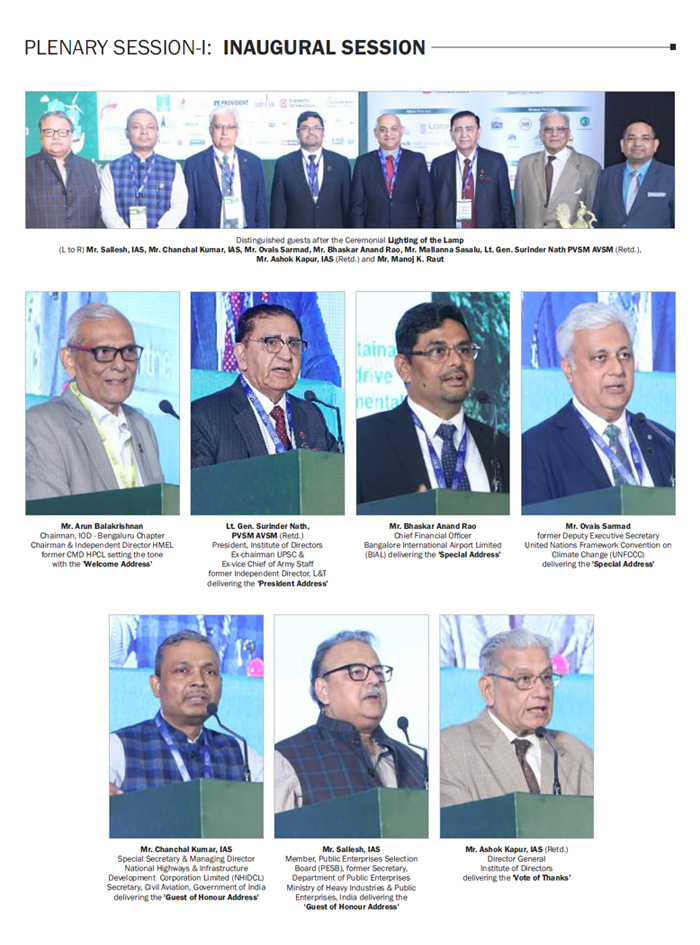
This was followed by the release of the Convention Souvenir by the ‘Guests of Honour’, Mr. Chanchal Kumar, IAS & Mr. Sailesh, IAS.
Plenary Session II – A Roadmap to achieving Net Zero Goals
The Session was Chaired by:
Mr. Ovais Sarmad
former Deputy Executive Secretary
United Nations Framework Convention on Climate Change (UNFCCC)
The 'Keynote Address' was delivered by:
1. Mr. Shaji K. V.
Chairman
National Bank for Agriculture and Rural Development (NABARD)
2. H.E. Mr. Achim Burkart
Consul General of Germany
3. H.E. Mr. Thierry Berthelot
Consul General of France
4. Mr. Mallanna Sasalu
Chief Operating Officer
Provident Housing Limited
Mr. Sarmad emphasised the importance of attaining net zero emissions as soon as possible in all domains, especially business and industries. He commenced by underlining the meaning of net zero emissions and its target to be achieved considering all aspects of the environment and economy. Business leaders play an important role in reducing the process of climate change and its impacts, as the government cannot take the whole responsibility alone and work towards it without proper social consciousness and efforts. He further explained that transformation should be radical, not incremental, and that just transition, which is people-centred but not profit-oriented, has a greater say in climate change crisis reduction. Meaningful change and measurable impacts have to be highlighted to achieve 'Net Zero'.
Mr. Shaji explained that a people-centric approach to achieving 'Net Zero' levels eventually concerns the agriculture and rural sectors, as the agriculture sector alone contributes 20% in greenhouse gas (GHG) emissions in India. He highlighted that it is not an individual country but the whole world that will have to face the looming climate war. India, being the 7th most vulnerable country as per the Climate Risk Index (CRI) 2021, has to take proactive measures to reduce its carbon emissions. He discussed the impacts of climate change on agriculture. Methane emissions from rice fields and livestock are a major concern. He suggested measures such as sustainable rice cultivation, practising rice breeding, reduced use of nitrate fertiliser, alternative wetting and drying, and cultivation of fewer water-intensive types of millet. He said that NABARD is focusing on the development of value chains for millets. The government has implemented schemes such as PMKUSUM, solar panel installation, natural farming, watershed development programmes, tribal development programmes, etc. NABARD is the accredited entity of many international climate change funds. He concluded by outlining the initiatives of NABARD in tackling climate change. The way forward is precision farming, energy-efficient cooling, climate-resilient technology, reorientation seed production, agroforestry, and digital technology.
H.E. Burkart spoke about the efforts of the European Union (EU) and Germany in achieving 'Net Zero' targets. He mentioned that the EU celebrated EU Green Week in early June on the theme 'Delivering a Net Zero World'. He said that the melting of ice glaciers (5 cubic kilometres) in Switzerland and the occurrence of wildfires in parts of Germany are consequences of anthropogenic climate change. He stated that the EU is always in the global front in combating climate change and has a comprehensive plan to achieve 'Net Zero' by 2050. The European Commission has recently proposed the Net - Zero Industry Act to improve conditions for clean technology in Europe, and the goal is to reach a production capacity of at least 40% of EU demand for key net zero technologies by 2030. It provides an incentive to take up teaching climate-neutral projects. EU climate policies focus on wind turbines, solar panels, batteries, and value change. The Commission has also presented plans for European hydrogen plants to support global hydrogen projects. He highlighted the efforts of German companies in the development of green jobs in India, especially in Bengaluru, with a Sustainability vision. International cooperation is needed in a big way. In this context, he also mentioned the signing of a MoU between the Indian Department of Science and Technology (DST) and Germany's Fraunhofer ISE as a move towards fulfilling the goal of decarbonizing economies.
H.E. Berthelot stated that the Paris Agreement is a benchmark for all the nations having Nationally Determined Contributions (NDCs) and is fully operational now. He explained how the French and Indian governments are putting together collaborative efforts in the form of the International Solar Alliance, developing a roadmap for the Blue Economy and Governance; how French companies based in India are producing electrical vehicles and working on green hydrogen; and the establishment of joint laboratories on water studies at the Indian Institute of Science, Bengaluru. He further explained that, domestically, France is implementing policies to root the ecological transition deep within society. 'France 2030' Investment Plan and the France 2020 Finance Bill dedicate 60 billion euros to ecological transition. Measures are being taken in the country to reduce air travel if the travel time is less than 2 hours to save fuel, and old cars polluting much more than new cars are not allowed in the city. A major focus is on the development of electric buses, promoting bicycles and Electric vehicles in the city. France is emphasising reduced energy consumption, accelerated development of renewables, energy efficiency, and the revival of the French nuclear energy sector. He mentioned that France has a Climate Risk and Early Warning System and has International Climate Finance, especially the Green Climate Fund.
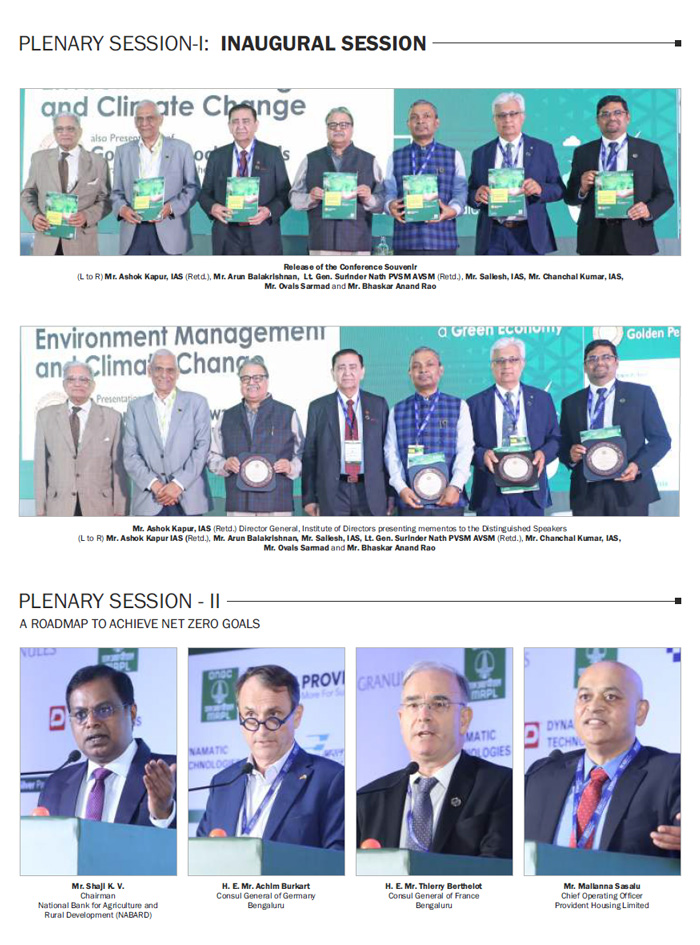
Mr. Sasalu mentioned how global warming happens, what we should do, who should take action, and when action should be taken against climate change. While representing Provident Housing Limited, a real estate development agency, he said that 39%of GHG emissions come from construction and development activities, while 11% of emissions come from material manufacturing. He said that organisations have to look at sustainable ways of adapting to Climate Change. Provident Housing Limited provides at least one tree per family when they undertake a project. He discussed the 'Green Plot Ratio' and how to achieve it through green cover and tree planting. He said that around 135 litres of water is used per day per individual, 45 litres are used for flushing (this is treated sewage water), and 90 litres are used for consumption and bathing. He mentioned that Provident Housing Limited is replenishing 30% of their waters through bore well recharge, segregating garbage into wet and dry components, and producing compost out of it. He mentioned electricity generation in low- and high-rise apartments, special economic zones, and electricity distribution norms there. Finally, he concluded his talk by saying that any investment in the sustainability world is for the future with good gain and greater economic value with sustainability aspects.
The Session was followed by an interactive Q&A with the audience.
Plenary Session III – Leadership for Promoting ESG Compliant Transformational Technologies
The Session was Chaired by:
Mr. Bhanu Prakash Srivastava
Chairman & Managing Director
Bharat Electronics Limited (BEL)
The Session had the following Distinguished Speakers:
1. Mr. Sanjay Kumar
Chairman & Managing Director
Granules India Limited
2. Mr. Rajeev Agarwal
Executive Director - Hindustan Aeronautics Limited (HAL)
3. Mr. P. S. Ramesh
Executive Director - Group Technical Services & HR Dynamatic Technologies Limited
4. Mr. K. P. Shivakumar
KES Project Director - Karnataka Highway Improvement Project
Public Works Department, Government of Karnataka
Mr. Srivastava spoke about a tradeoff between economic growth, developmental activities, and a sustainable environment. He stressed more about the scope of new technologies in bringing sustainable production techniques that work towards minimising the adverse impacts of technologies on the climate. BEL always gives aspects of the environment the utmost priority on the sustainability agenda; it is also involved in sensitising all its employees regarding how they can reduce emissions at every stage of production, etc. BEL receives 75% of its energy from renewable sources, and it is expected to receive 100% of its energy from renewable sources by 2025–26.
Mr. Kumar said that Climate Change is more than a threat; it is an opportunity from a business point of view. India, being a fastgrowing economy, will become a bigger consumer market. India has a demographic dividend and has people and industries with diverse backgrounds with immense potential to become a developed country in the coming 25 years. He spoke about the ESG framework and how the French, German, and U.S. economies are adopting sustainable practises in the business arena. He mentioned that Global Climate Change and India's growth aspirations are the major challenges to business in India. Access to renewable energy is an important pillar of the decarbonization facet; hence, there are various technologies. Chemistry-based technologies, for example, salt based storage and iron-air batteries, convert available renewable energy to potable energy, especially green hydrogen. He mentioned that Granules India Limited uses biocatalysts and organic catalysts to reduce energy consumption in pharmaceuticals, and it has partnered with Greenko Limited to get a continuous supply of carbon-free energy. These efforts are made in the way of providing carbon-free medical products to customers. He further mentioned that Scope 3 emissions contribute 80%, and hence the solution lies in bringing about sustainable changes in this field.
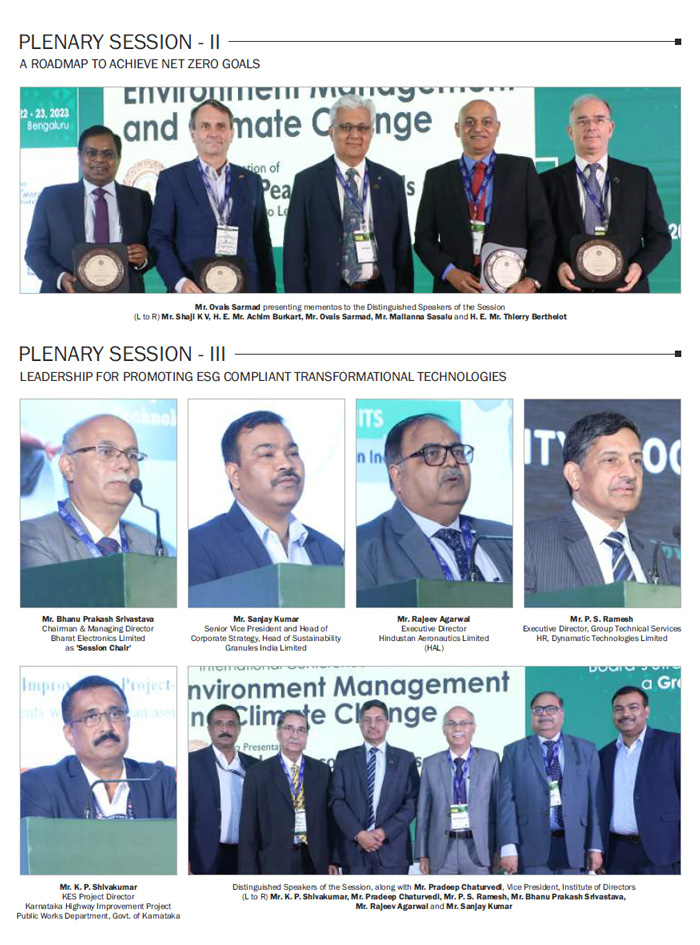
Mr. Agarwal said that implementing ESG is a must, but the main challenge lies in its implementation. In Hindustan Aeronautics Limited (HAL), the key aspect of a sustainable journey is process improvement that aim to reduce adverse impacts. He mentioned that there is a positive correlation between ESG implementation and financial performance, stakeholder engagement, proactive risk management, reputation enhancement, innovation, and the advancement of environmental goals. He further explained that ESG is a powerful concept; leaders in HAL are inspired to educate and build awareness among its employees. Building technologies to support ESG should be the main approach where carbon footprint, impact measurement, environmental tracking systems, energy management systems, capital and human management, waste management technologies, and sustainability supply chain solutions can be taken care of. He listed the constraints in ESG implementation as lack of clear metrics and standards, unclear direction, cultural resistance, and knowledge gaps. Hence, successful implementation of ESG depends on the behaviour of the organisation in handling these constraints. Finally, he mentioned that tracking our movements with respect to ESG with a holistic approach is important.
Mr. Ramesh spoke about air pollution and water depletion, especially drinking water and waste management. He discussed the 17 broad UN SDGs and the responsibilities of individuals and industries to recognise, understand, and take up work on any of them. He said that the focus areas of Dynamatic Technologies Limited are agriculture, aerospace, metallurgy, and sustainability. He stated that the organisation is concerned about environmental, social, and governance issues, which is why they have expanded their focus to solar and wind panels, R&D in farming activities, water conservation and recharging, biodiversity preservation, and improving air quality. He outlined the organisation's CSR projects and how money generated from them is fully utilised towards capacity building, training, educating, and mentoring, as well as teaching programming tools and artisan skills to the rural youth in the Doddaballapura Region near Bengaluru. He listed out activities to be considered for ensuring environmental protection, such as going green, saying no to plastic use, drip irrigation, LED lamps, natural ventilation, and preparing minds to nurture the environment
Mr. Shivakumar stated that the Karnataka State Highway Improvement Project is a special purpose vehicle to construct the state highways and sustainable road construction based on three pillars of ESG, such as an environment and traffic safety management plan, a social survey, comprehensive resettlement action plans, a road safety audit to avoid and reduce accidents by 50% by 2030, a district grievance redressal cell, a complaint handling mechanism, and a public response centre. He mentioned that in order to prioritise sustainability, they have taken ISO certification, e-learning and training programmes for all engineers, and quality assessment and management programmes. He also described the initiatives taken to manage climate uncertainties in the projects as air, water, and noise quality monitoring, groundwater recharge and preservation, tree planting and landscaping to reduce soil erosion, restoration and rehabilitation of biodiversity, and renewable energy.
The Session was followed by an interactive Q&A with the audience.
Plenary Session IV – Green Growth Solutions and Sustainable Development
The Session was Chaired by:
Mr. Giridhar Sanjeevi
Executive Vice President & Chief Financial Officer
Indian Hotels Company Limited (IHCL), India
The Distinguished Speakers of the Session were:
1. Dr. Jagmohan Sharma, IFS
Director General - Environmental Management and Policy Research Institute (EMPRI)
2. Mr. Prakash Netalkar, IFS
Managing Director - Karnataka Cashew Development Corporation Limited
3. Dr. Ram Prasath Manohar V., IAS
Director - Department of Tourism, Government of Karnataka
4. Mr. Mohammed Anzy S.
Chief Operating Officer - SAP Labs India
Mr. Sanjeevi articulated that it is the prime responsibility of civic societies to be conscious and make efforts towards Green Growth solutions. He explained how climate variations can bring about abrupt changes in temperature, rainfall patterns, especially in inducing droughts. He cautioned about current policies and practices stating that they are heading us towards a 3% rise in temperature by 2100. Hence there is a need for highly conscious efforts towards achieving the stated net zero targets. He explained the principle of Common but Differentiated Responsibilities (CBDR), stating that differentiated responsibilities do not mean slow action, but an accelerated action to safeguard the environment. He added that the energy sector is the biggest contributor of emissions, the next one being transportation and then agriculture; hence, it is time to focus and prioritize action in these sectors. He explained the concept of 'circular economy' with the help of ideas such as Reduce, Reuse and Recycle concepts, while also mentioning 'panchamrit' production and green hydrogen technologies. He commended the work of NITI Aayog towards e-waste management and plastic recycling. Finally, he explained the pivotal role of three innovation models i.e. Technology Model, Business Model and Financial Innovation model in bringing about green growth and sustainable development.
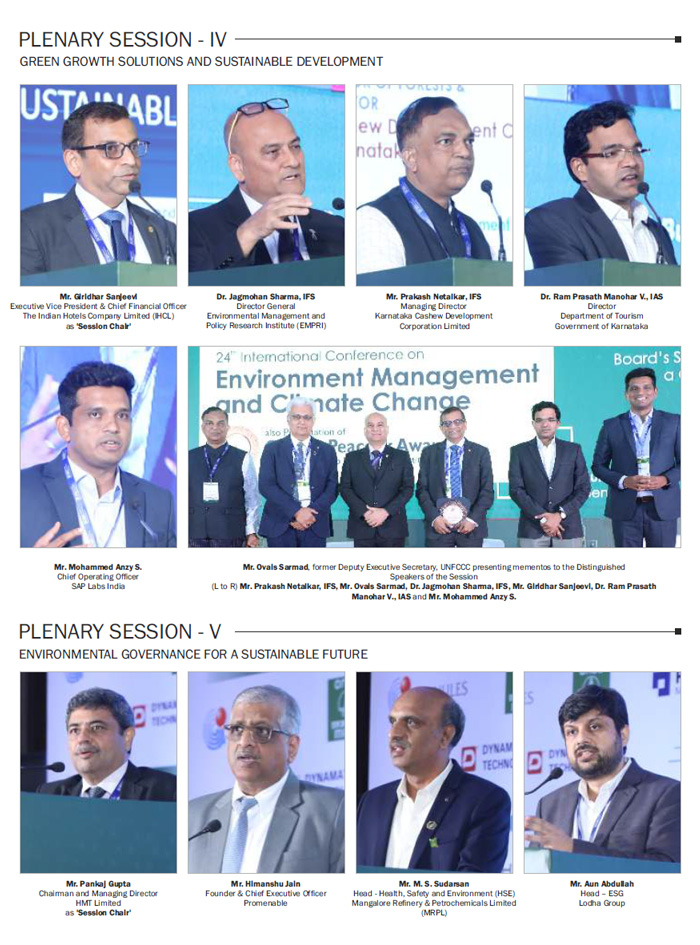
Dr. Sharma said that the level of investment taking place in GDP development is unbalanced, as the private sector, being resource rich, has a higher stake of 20% while the public sector has a stake of 7–8% only. He said, “Climate Change is an adversity, but there are indeed opportunities”, and the private sector actively explores these opportunities, always keeping feasibility in mind. He mentioned three legally binding instruments under the UN Convention i.e. End Plastic Pollution Resolution, Convention on Biological Diversity (CBD), and UN Convention on the Law of the Sea on the Conservation and Sustainable Use of Marine Biological Diversity. He explained that the safe operating boundaries of human are shrinking because of the increasing ocean acidification, biodiversity loss, pollution from novel entities, the most prominent being 'plastic'. He further stated that by 2030, the GDP of India will be impacted atleast by 4-5% due to productivity loss and heat waves. Hence, economic growth with minimal environmental impact or environmentally compatible growth is essential. Manufacturers and producers ignore environmental costs of their final product. He further outlined a few adaptation and mitigation strategies, drawn from various sectors by the National Action Plan on Climate Change and environmental carrying capacity assessment made at the Bandipur National Park by Environmental Management and Policy Research Institute (EMPRI).
Mr. Netalkar presented how individuals / communities can develop holistic long term strategies for green growth through cashew plantations. Being a prominent horticultural crop, cashew trees can be grown in degraded lands with very minimal care. He noted that cashew crop with its deep rooting system prevents soil erosion and helps to bring about extended green cover, thus contributing to the enhanced microclimate condition and microbial activities in the ground. These trees cost zero pollution and have positive effect on boosting air quality, maintaining water balance and increasing humus content in the soil. Knowing their potential, Central Government has made efforts through RKVY and National Horticultural Mission schemes to create awareness among farming communities regarding various tree and plantation crops.
Dr. Manohar emphasised the importance of eco-tourism in Karnataka to bring about Green Growth and sustainable development. The Karnataka Tourism Department has developed a sustainable strategy to enhance the value of forests and the environment through Jungle Lodges and Resorts. He said that along with value creation, such efforts also lead to employment generation in rural areas. Through these activities, sensitization of local people towards the importance of having green cover and sustainable practises is also being carried out. Eco-Tourism will also empower the renewable energy base of the country, benefiting both tourism and the environment. Providing responsible luxury with the circular economy concept is emphasised, as water treatment and waste recycling are part of these stratgies. He also stressed the importance of green buildings, the development of the hospitality sector, and rainwater harvesting, in bringing green growth to the economy.
Mr. Anzy said 'sustainability and profitability do not go hand in hand'; and said how it is truly just a myth. He said that many businesses believe and have proven that sustainability and profitability can indeed go 'hand in hand'. He stressed that Indian businesses have to see value in sustainable strategies, or else they will face huge cost constraints in the coming future. About 62% of businesses have signed up for Sustainability Reporting, and these views have arisen because of the regulatory framework on sustainability inclusion. At the end, only 17% of these businesses had actually calculated and reported it. He stated that there is a huge gap between intent and execution, and this has to be minimised. Organisations have to focus on their actual carbon emissions, and scope 3 emissions have to be calculated as reliable measures of emissions. He explained how SAP Labs in India are on the path to sustainable development and green growth: 98% of the energy that they use is green energy from renewable sources; transportation of products is through electric vehicles; 31% of water is recycled for reuse; and 3.8 metric tonnes of hazardous waste recycling is also done regularly.
The Session was followed by an interactive Q&A with the audience.
Plenary Session V – Environmental Governance for a Sustainable Future
The Session was Chaired by:
Mr. Pankaj Gupta
Chairman and Managing Director - HMT Limited, India
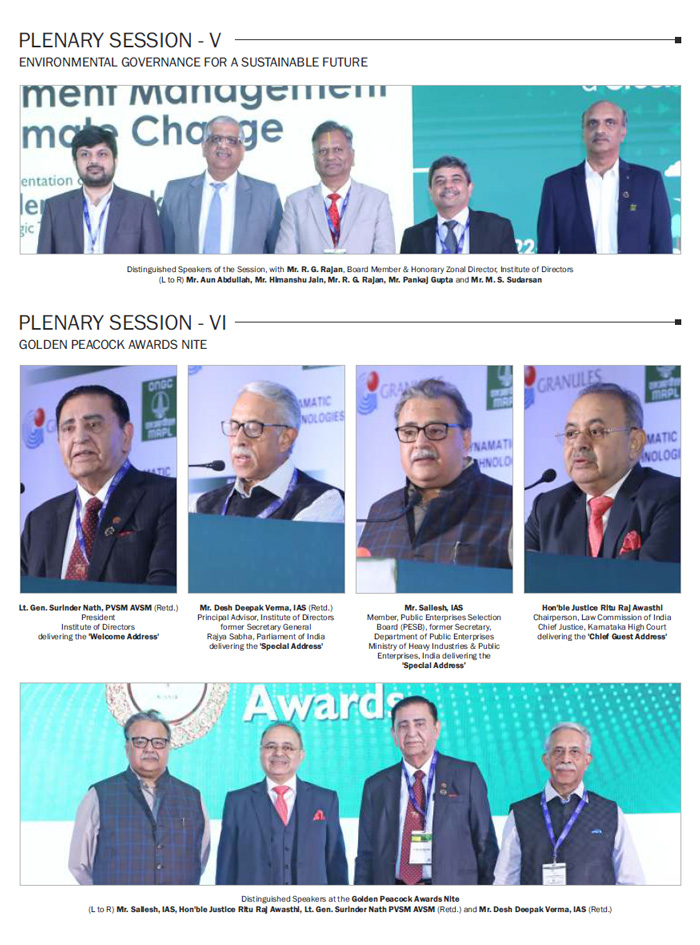
The Distinguished Speakers at the Session were:
1. Mr. Himanshu Jain
Founder & Chief Executive Officer - Promenable
2. Mr. M. S. Sudarsan
Head - Health, Safety and Environment (HSE)
Mangalore Refinery & Petrochemicals Limited (MRPL)
3. Mr. Aun Abdullah
Head – ESG, Lodha Group
Mr. Gupta explained about environmental challenges, climate change, loss of biodiversity, pollution, and rapidly emerging challenges that require urgent and utmost attention and action through collaboration between governments, businesses, and individuals. He articulated 'Environmental Governance' as the management of Natural resources to ensure sustainability and protection by creating a policy framework. The leadership in a company has a strong role to play in the will of the company to take steps and protect the environment. He stated the importance of short-term plans along with strategies to achieve a sustainable future. The availability of reliable and competitively priced energy would be a fundamental prerequisite to ensuring high levels of ecological growth. He mentioned that a number of policy considerations, such as green hydrogen, offshore wind policy, the introduction of electric vehicles, easy terms for open market access to procure green energy, production-linked incentive schemes, providing new and proven storage technologies, and incentivizing green carbonization centres, show the Indian Government's determination towards a sustainable future.
Mr. Jain briefly explained the ESG framework. He mentioned that harmony with nature and caring for future generations are indeed needed. Through the example of plastic and paper straws, he described how cheap goods fetch more consumer attention than sustainable products. This is because people's willingness to spend an extra rupee on sustainable products is lower; and that is because of a lack of demand, know-how, and motivation among the players. In ESG, the 'E' should be economical, because if the solution is environment-friendly but not economical, then adaptation resistance will be extremely high and it won't fly, and this is a challenge that many businesses and industries face. He said that an eco-friendly product has to go hand in hand with public affordability. This can be achieved by challenging the conventional notion of cost. He spoke about innovation and intellectual capital as ways to achieving good environmental governance and a sustainable future.
Mr. Sudarsan discussed the path undertaken by Mangalore Refinery & Petrochemicals Limited (MRPL) towards achieving 'net-zero'. He listed the melting of arctic sea ice, green land ice sheets melting, Amazon rainforest land degradation, and 'Atlantic Meridional Overturning Circulation' (AMOC) as some of the indicators of climate change. He mentioned that Bhutan, Suriname, and Panama have already been declared 'carbon negative' with more than 70% green cover. China, the USA, and India are the leading emitters of GHGs, and immediate action should be taken to reduce these emissions by neutralizing them through long-term and short-term monitoring and evaluations. He presented 'Scope 1, 2, and 3 emissions. He further explained about MRPL's status of de-carbonisation, as it is the largest producer of CO2, and 4 million metric tonnes of CO2 equivalents have been produced, and 36.3 billion metric tonnes of CO2 equivalents from the value chain have been produced. MRPL has already started decarbonisation by importing green power and plans to establish 500-tonne-per-hour green hydroelectric plants. Their aim is to shift products from fuelbased ones to non-fuel-based ones in the near future.
Mr. Abdullah said that the focus on Sustainability has evolved over the years, and new sustainable technologies have brought climate principle to the centre. Being the largest real estate developers in the country, he said that they are tackling physical risks through resilience and transition risks through decarbonization. They have developed Palava City near Mumbai, where the whole city was conceptualised to encounter the problem of urbanisation by bringing sustainable pathways'. He mentioned that historic data is no longer representative of the current picture; hence, global climate models have been used in designing projects. They have developed 'Lodha Net Zero Urban Accelerator' that breaks down carbon emissions into component parts that ease the monitoring and analysis of energy use. He highlighted the role of climate resilience, global mobility, and global cooling concepts in achieving a sustainable future.
The Session was followed by an interactive Q&A with the audience.
Plenary Session VI – Golden Peacock Awards Night
The 'Welcome Address' was delivered by:
Lt. Gen. Surinder Nath PVSM, AVSM (Retd.)
President - Institute of Directors
Lt. Gen. Nath gave a warm welcome to the 'Chairman', Hon'ble Justice M. N. Venkatachalaiah, National Chairman, Institute of Directors former Chief Justice of India, former Chairman, National Human Rights Commission of India; and the 'Distinguished Guest of Honour', Mr. Sailesh, IAS, former Secretary, Department of Public Enterprises, Ministry of Heavy Industries & Public Enterprises, India; and the Chief Guest, Hon'ble Justice Ritu Raj Awasthi, Chairperson, Law Commission of India former Chief Justice, Karnataka High Court. He also welcomed other important distinguished dignitaries & guests, and congratulated all the winners of the Golden Peacock Awards. He mentioned that the Golden Peacock Award had been instituted by the Institute of Directors (IOD), India in 1991, and have since contributed in advancing corporate governance standards in various Indian industries. These Awards, one of the flagship initiatives of IOD, have been recognized India-wide as an honor of excellence. The process of the selection of winners of this Award is highly transparent, rigorous, independent, competitive and meticulous. The process involves a three stage assessment with domain specialists. Assessment teams comprise occupational Health & Safety, environment management, eco-innovation and energy efficiency experts. The award effectively harnesses competitive awareness of various companies. It also helps participant companies by show-casing Models of Excellence that act as a guideline and direction for improving their performance.
The 'Special Address' was delivered by:
Mr. Desh Deepak Verma, IAS (Retd.)
Principal Advisor, Institute of Directors
former Secretary General, Rajya Sabha, Parliament of India
Mr. Verma began by outlining the goals of IOD, which may be summed up as establishing 'Building Tomorrows Boards' respectively. He articulated sustainable growth as growth with optimal utilisation of available resources, accounting for reduced emissions, and achieving set objectives. Though we are all talking about Sustainability, it has not been addressed practically, as sustainable use and consumption have not been looked upon as part of this process. Hence, Sustainability has to become part of our lifestyle; it should get into our thinking process and our whole mindset. Internalising Sustainable practises not only improves personal but also corporate life. He explained the importance of the Golden Peacock Awards in encouraging Indian companies to become practical and sustainable solutions to global sustainability problems. He also mentioned that IOD has 19 award categories, of which four of them are in the Global Category.
The 'Guest of Honour Address' was delivered by:
Mr. Sailesh, IAS
Member, Public Enterprises Selection Board (PESB)
former Secretary, Department of Public Enterprises
Ministry of Heavy Industries & Public Enterprises, India
Mr. Sailesh spoke about the conference souvenirs and categories of Awards, nominations, and screening processes. He mentioned that each member in the Jury is a legend and also they come from highly diversified backgrounds which make the selection process very competitive. He discussed about awardees as they have expanded perspectives towards environmental sustainability aspects. They are dealing with audits, business risks, and complex issues with corporate social responsibility risk committees and eventually they are becoming pillars of sustainable growth in the economy. He highlighted the importance of regulatory frameworks, compliance requirement and higher responsibilities of the private sector entities in bringing sustainable change in the nation. He explained that the private sector has taken the responsibility to help the nation's economic and sustainable growth and we are going to be the pioneers and leaders in the global stage in wealth creation and sustainable living. He further discussed about the private and public sector role in changing the lives of common people. New age companies have set higher benchmarks all over the globe by scaling innovative technologies which have conscious responsibilities towards society.
The 'Chief Guest Address' was delivered by:
Hon'ble Justice Ritu Raj Awasthi
Chairperson, Law Commission of India
Chief Justice, Karnataka High Court
Justice Awasthi spoke about Hon'ble Justice M. N. Venkatachaliah's role in shaping IOD's knowledge and reach. He spoke about the conference theme, 'Board's Strategy towards a Green Economy', and said that it could not have been more relevant as Climate Change and the environment are burning issues of the present time. IOD has been at the forefront of shaping and influencing corporate policies and empowering industries to have sustainable growth. He mentioned that the focus of corporations need to shift to Waste Management through new and more innovative approaches to be able to minimize business risks. He said that technologies can be game-changers in the area of environmental management and highlighted the role of Micro, Small, and Medium Enterprises. He discussed the G20 Presidency, its core theme - Vasudhaiva Kutumbakam (the world is one family) and its roots in India's ancient tradition and civilization. He spoke about the values of Indian tradition and how ancient culture is connected to the actual knowledge of having a sustainable lifestyle. He highlighted the role of electric vehicles as better means of transport, the usage of emission-free input materials by industries, and green value change to create products that have a low carbon footprint and that are sustainable.
The Session was followed by an interactive Q&A with the audience.
Mr. Pradeep Chaturvedi, Vice President, Institute of Directors, proposed the 'Vote of Thanks'. On behalf of the Institute of Directors, he thanked the Chief Guest, Hon'ble Justice Ritu Raj Awasthi, and Guest of Honour, Mr. Sailesh, IAS for gracing the event. He also thanked all the distinguished guests and speakers for their participation.
DAY 2, JUNE 23, 2023
Plenary Session VII – Case Study Presentations
Success Stories on Effective Implementation of Occupational Health & Safety (OHS)
The Session was Chaired by:
Lt. Gen V. K. Ahluwalia PVSM, AVSM, YSM, VSM (Retd.)
Board Member on multiple Boards
former General Officer Commanding-in-Chief
Central Command, Indian Army
Lt. Gen. Ahluwalia commenced his talk by sharing his experience in the Indian Army about safety and health, saying that it's not expensive, but priceless and that implementation is the bane of our country's system. He quoted the Economic Times headline, 'Strong policy-changes cause US manufacturing to reduce air pollution'. He referred to the US-enacted Occupational Safety and Health Act, which ensures safe working conditions and a suitable environment for the physical and mental well-being of all workers in the company. He mentioned that workers could be exposed to different hazards such as physical, biological, chemical, mechanical, ergonomic, and psychosocial irrespective of the nature of the organisation, global warming and climate change, etc. He mentioned that the transition from the existing industries to green industries would create insecurities. He presented a case study of Kargil, the Line of Control, and the National Highway, highlighting the Occupational Safety and Health and Green Economy Strategies. He explained the Operation Green Curtain, its challenges, and its relevance, which led to the creation of Operation Green Kargil, which facilitated the generation of local employment, reduction of greenhouse gases, optimisation of land utilisation, eco-balance, and better safety and health of the troops. He concluded that a small thought can have a great impact when devising strategies to create economic and ecological balance. He then warmly welcomed all the presenters of the case studies.
Case Studies in the Effective Implementation of 'Occupational Health & Safety (OHS)' category were shared by the below-mentioned companies:
1. Tata Motors Limited – Automobile
2. Mercedes-Benz Research and Development India Private
Limited – Automobile (Research and Development)
3. Bosch Limited - Automobile Ancillary
4. Dow Chemical International Private Limited - Chemical
5. Grasim Industries Limited – Chemical
6. Larsen & Toubro Limited - Construction
7. Cummins India Limited - Engineering
8. Reckitt Benckiser India Private Limited - FMCG
9. Vedanta Limited, Cairn Oil & Gas, Raageshwari Gas
Terminal, Raageshwari Oil and Gas Mine – Gas
10. Reliance BP Mobility Limited – Hydrocarbons
11. Honeywell Technology Solutions Lab Private Limited – IT
12. Hindustan Petroleum Corporation Limited, LPG Bottling Plant – Oil LPG Bottling
13. Castrol India Limited – Oil Lubricant
14. Asian Paints Limited – Paints
15. NTPC Limited, Anta Gas Power Station – Power Generation
16. Avaada Energy Private Limited – Power Renewable
17. Shapoorji Pallonji & Company Private Limited – Real Estate & Construction
18. JSW Steel Limited – Steel
19. Nhava Sheva (India) Gateway Terminal Private Limited - Transportation (Ports)
Each Presentation was followed by an interactive Q&A with the audience.
Plenary Session VIII – Curating a Comprehensive Approach to Climate Resilient Economic Development
The Session was Chaired by:
Mr. Pradeep Chaturvedi
Vice President - Institute of Directors
The Session had the following Distinguished Speakers:
1. Dr. Rangan Banerjee
Director - Indian Institute of Technology, Delhi (IIT-D)
2. Mr. Rajan Sethuraman
Chief Executive Officer - LatentView Analytics
3. Ms. Sunita Garware
Chairperson - Raphael Ryder Cheshire International Centre (RRCIC)
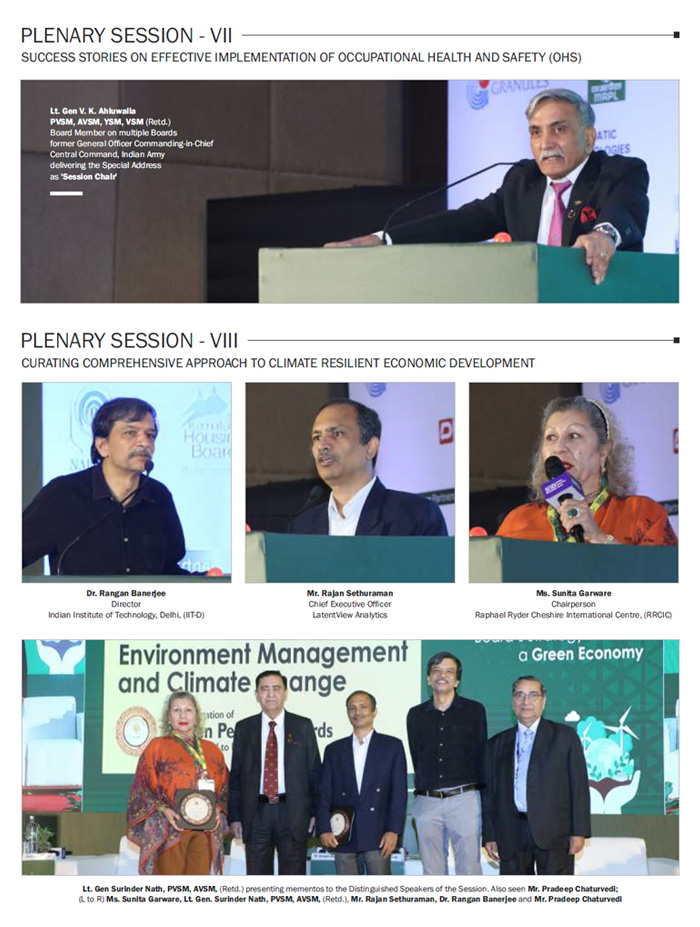
Mr. Chaturvedi expressed that climate-resilient development is for economic growth development and that sustainability and sustained development are interchangeable words, whereas resilience is associated with the economy. He said that achieving economic development will have challenges due to climate change. Major companies are seeking to set up risk management systems and working towards resilience so that climate risks can be turned into opportunities. He mentioned that most companies have opted for Artificial Intelligence in the last two to three years and found better ways to overcome safety concerns. He said that industries directly responsible for a higher contribution to emissions should focus on reducing their energy consumption and, in turn, improves the economy. He then welcomed the distinguished speakers to take the Session forward.
Dr. Banerjee started by discussing how Indian society is completely aware of the threat of climate change. Climate Change is real; its consequences and effects are seen every day, and countries and governments across the world have made national commitments to change the way energy systems operate. India's global commitments made by its Prime Minister in Paris and Glasgow will not only enhance renewable energy but also lead India to Net Zero by 2070. He explained the genesis of Climate resilience by quoting examples about the history of human development being dependent on energy systems, particularly fossil fuels, and how development is 'anthropocentric'. This Anthropocentric development utilises all resources to maximise human comfort, which has led to Climate Change and endless exploitation of the earth's natural resources. He expressed that companies' core nature of business will change and that the energy transition will not be just a technical system but a sociotechnical system. He stated that if the transition is done to renewables, there will be variability in supply and demand and a need to ensure that the transition is made cost-effective. He expressed that for curating a climate-resilient environment, many technical solutions are available, but they all involve costs. A successful transition should be able to support the population that is currently dependent on traditional energy systems. He concluded by saying that with a concerted effort by industry, academia, government, and the scientific community, a climate-resilient infrastructure could be built for a climate-resilient economy.
Mr. Sethuraman started by discussing the way organisations can utilise the power of data and analytics to drive change in the transition towards Sustainability. He said that around 93% of the top organisations have embraced data-driven sustainability. He commended the use of AI in the identification of health, safety, and occupational hazards as presented by various organisations in the previous Session. He explained through various examples that, with the help of data analytics, the concept of Sustainability can be weaved into the products and services of organisations, which in turn helps them to cut down their emissions and move towards a green economy. Generally consumers around the world are more attracted to companies that develop new products and services in a sustainable fashion. He concluded by stating that Data Analytics will play a crucial role in making decisions in order to fund organisations and businesses that work towards mitigating Climate Change and strive towards creating a green environment.
Ms. Garware discussed the philanthropic work and activities undertaken by Raphael Ryder Cheshire International Centre (RRCIC) for disabled children at their Centre. She shed light on the history of RRCIC and its main mission, 'to relieve suffering of any kind'. She also discussed that 120 people live happily at RRCIC and get nurtured and cared for. She mentioned the early intervention programme that helps disabled children carry out their daily routine in the most normal way possible. She thanked IOD for providing an opportunity to showcase their noble cause to the august audience.
Each Session was followed by an interactive Q&A with the audience.
Plenary Session IX – Case Study Presentations
Success Stories on the Effective Implementation of 'Environment Management', 'Eco Innovation' & 'Energy Efficiency'
The Session was Chaired by:
Mr. R. G. Rajan
Board Member and Honorary Zonal Director - Institute of Directors
former CMD, RCF/NFL/PDIL
former Chairman FAI & SCOPE
Mr. Rajan emphasised on the quick action required to be taken with regard to environmental management, climate change, and path towards achieving Net Zero. He highlighted that IOD has been working on these pressing issues for the last 30 years. He congratulated the winners of the Golden Peacock Awards in the category of 'Environment Management, Eco Innovation and Energy Efficiency' for the year 2023 and then warmly welcomed all the presenters to showcase their case studies.
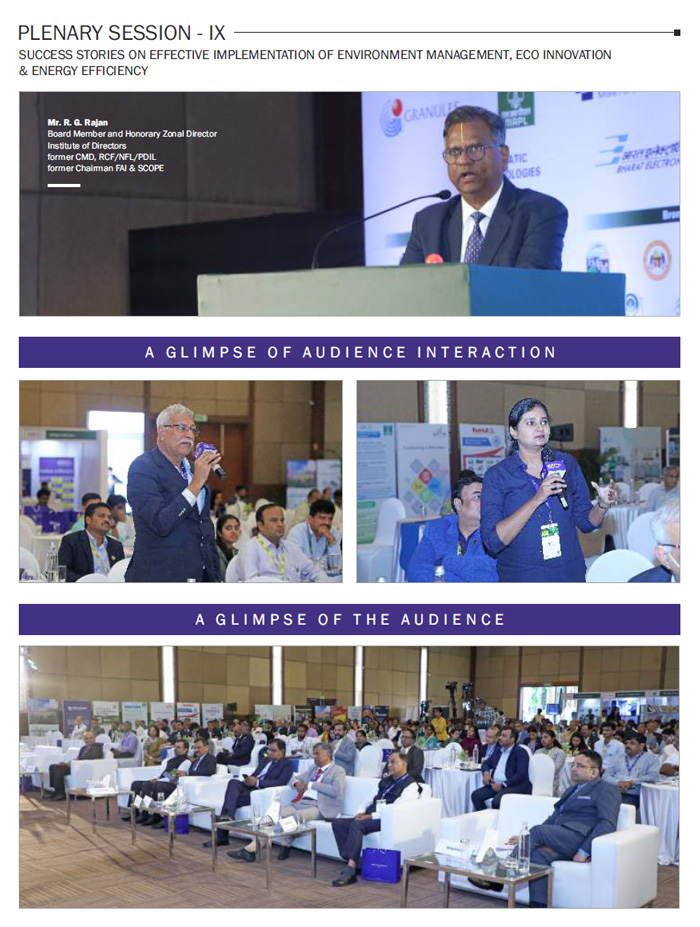
Case Studies in the 'Environment Management' category were shared by the below-mentioned companies:
1. EXL Service.com (India) Private Limited – BPO
2. Hindustan Unilever Limited – Food & Beverages
3. Odisha Mining Corporation Limited – Mining & Metallurgy
4. Oil and Natural Gas Corporation Limited – Oil Production
5. Bharat Petroleum Corporation Limited, Mumbai Refinery – Oil Refining
6. Adani Transmission Limited – Power Transmission
7. Steel Authority of India Limited – Steel
Case Studies in the 'Eco Innovation' category were shared by the below-mentioned companies:
1. Welspun Flooring Limited – Building Materials
2. Defence Research and Development Organisation – Government (Defence)
3. Tata Steel Limited – Mining & Metallurgy
4. Oil and Natural Gas Corporation Limited – Oil Production
Case Studies in the 'Energy Efficiency' category were shared by the below-mentioned companies:
1. Honda Motorcycle & Scooter India Private Limited – Automobile
2. Nuvoco Vistas Corp. Limited – Cement
3. Timken India Limited – Engineering
4. TK Elevator India Private Limited – Engineering 5. Rashtriya Chemicals and Fertilizers Limited – Fertilizer
6. Apollo Specialty Hospitals – Healthcare
7. JK Paper Limited – Paper
8. NTPC Limited – Power Generation 9. Brookfield India Real Estate Trust – Real Estate & Construction
10. Cavendish Industries Limited – Rubber
The Presentation was followed by an interactive Q&A with the audience.
Plenary Session X – Summary of Recommendations
The 'Closing Remarks' and the 'Vote of Thanks' were proposed by:
Mr. Manoj K. Raut
CEO & Secretary General - Institute of Directors, India
Mr. Raut proposed the 'Vote of Thanks'. On behalf of the Institute of Directors (IOD) and its Governing Council, he thanked the Chairman, Hon'ble Justice M. N. Venkatachailah, for being a true mentor and guide, particularly for expanding the national and global footprint of IOD over the last 10 years.
He extended special thanks to the Guests of Honour, Mr. Sailesh, IAS and Mr. Chanchal Kumar, IAS, and Chief Guest, Hon'ble Justice Ritu Raj Awasthi, for their gracious presence. He also thanked Lt. Gen. Surinder Nath, AVSM PVSM, President; Mr. Pradeep Chaturvedi, Vice President; Mr. R. G. Rajan, Honorary Zonal Director; Mr. Ashok Kapur, Director General; and Mr. Desh Deepak Verma, Principal Advisor of IOD, for making the event the success that it was
He also extended his heartfelt congratulations to all the winners of the Golden Peacock Awards. He appreciated the passion, commitment, and best efforts every industry put forward towards environmental protection. He conveyed the message that we can nurture a Sustainable future with every small effort and new initiative and that an impactful change cannot be achieved in silos towards real climate action. He stressed that the three worlds—business, Finance, and government—must align and collaborate both in intent and action to create a sustainable climate action agenda, which requires leadership and stakeholders across the entire ecosystem. He also mentioned that ESG has become a top priority and core business strategy for various business courses, with concern being expressed by investors, regulators, and stakeholders. He also highlighted the discussions and negotiations that took place at COP26 and COP27. With regard to the guidelines and requirements of COP, he remarked, 'Comply or Perish', and further said that working closely together, business and governments can deliver a greener future and unlock many opportunities.
He said that according to PwCs 26th Annual Global CEO Survey, 40% of global organisations will no longer be economically viable in the next 10 years if they continue with their current working model, and thus there is a need to adopt a business model that integrates all the SDGs. He expressed that green line growth will be crucial and will lead to Sustainability. India, being a global player and with a demographic dividend, is already seeing rising ‘conscious consumerism', and with this, industries should focus on their efforts to reduce carbon footprints and toxic emissions and promote a Circular Economy. He also mentioned that the UN SDGs, particularly Goal 13, will be crucial in taking urgent action to combat Climate Change. He also said that we need to focus on principles of solidarity, and concern for future generations while holding on to our ethical values and ethos in constant focus. He also expressed that today's world is preparing for natural calamities such as cyclones, droughts, floods, heat waves, and global warming, as these will be the 'new normal' tomorrow. We will learn to adapt and turn adversity into opportunity. In today's digital age, the whole world is exploring the game-changing potential of Artificial Intelligence (AI) and perhaps AI could become a gamechanger to overcome greater challenges and create more opportunities for business.
He commented on the target set by India to attain Net-Zero by 2070 and expressed his confidence that India will achieve this before the deadline. He concluded by saying that for a young democratic country such as India, the next two decades will be crucial as it has higher aspirations to fulfill.
He particularly thanked senior state Govt. officials who had taken time off to participate in the conference in spite of being held on working days.He extended thanks and gratitude to all the Distinguished Speakers, Guest Speakers, Chairs of the Sessions, Foreign experts, Presenters, and Participants.
He also thanked the authorities at Lalit Ashok Hotel for the admirable arrangements.
IOD is especially grateful to its Event Partners:
Our Platinum Partner:
Bangalore International Airport Limited (BIAL)
Our Gold Partners:
1. Dynamatic Technologies Limited
2. Granules India Limited
3. Provident Housing Limited
4. Bharat Electronics Limited (BEL)
5. Mangalore Refinery and Petrochemicals Limited (MRPL)
6. Sattva Group
Our Silver Partners:
1. HMT Limited
2. Lodha Group
3. The National Highways and Infrastructure Development Corporation Limited (NHIDCL)
Our Bronze Partners:
1. Environmental Management & Policy Research Institute (EMPRI)
2. The Hutti Gold Mines Company Limited
3. Karnataka State Highways Improvement Project (KSHIP)
4. National Bank for Agriculture and Rural Development (NABARD)
5. VBHC Value Homes Limited
6. Jute Corporation of India (JCI)
7. Karnataka Housing Board (KHB)
Our Associate Partners:
1. Karnataka Vidyuth Karkhane Limited (KAVIKA)
2. Oil India Limited
3. Hindustan Aeronautics Limited (HAL)
4. Yokogawa Electric Corporation
5. Karnataka Tourism
Supported by:
1. IOD Foundation (IODF)
2. World Environment Foundation (WEF)
This report has been compiled by:
Mr. Ashok Kapur, IAS (Retd.)
Director General - Institute of Directors
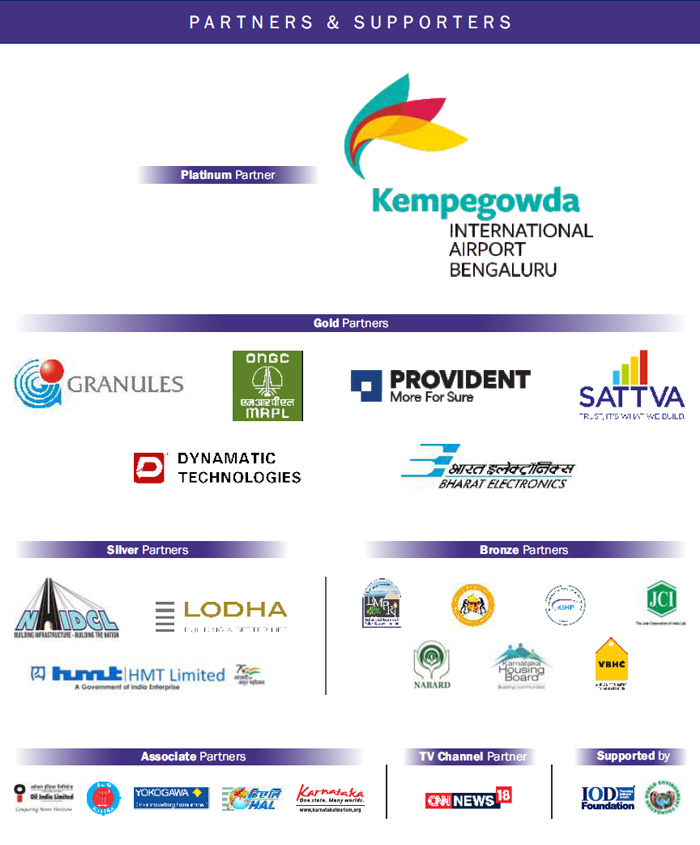

Bringing a Silent Revolution through the Boardroom
Institute of Directors (IOD) is an apex national association of Corporate Directors under the India's 'Societies Registration Act XXI of 1860'. Currently it is associated with over 30,000 senior executives from Govt, PSU and Private organizations of India and abroad.
Owned by: Institute of Directors, India
Disclaimer: The opinions expressed in the articles/ stories are the personal opinions of the author. IOD/ Editor is not responsible for the accuracy, completeness, suitability, or validity of any information in those articles. The information, facts or opinions expressed in the articles/ speeches do not reflect the views of IOD/ Editor and IOD/ Editor does not assume any responsibility or liability for the same.
About Publisher

Bringing a Silent Revolution through the Boardroom
Institute of Directors (IOD) is an apex national association of Corporate Directors under the India's 'Societies Registration Act XXI of 1860'. Currently it is associated with over 30,000 senior executives from Govt, PSU and Private organizations of India and abroad.
View All BlogsMasterclass for Directors
Categories